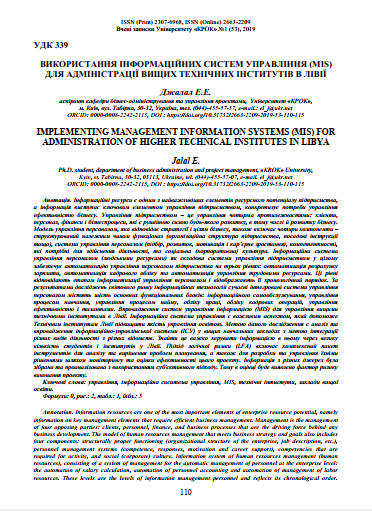IMPLEMENTING MANAGEMENT INFORMATION SYSTEMS (MIS) FOR ADMINISTRATION OF HIGHER TECHNICAL INSTITUTES IN LIBYA
DOI:
https://doi.org/10.31732/2663-2209-2019-53-110-115Keywords:
management, information management, MIS, technical intuitions, institutions of higher educationAbstract
Information resources are one of the most important elements of enterprise resource potential, namely information on key management elements that require efficient business management. Management is the management of four opposing parties: clients, personnel, finance, and business processes that are the driving force behind any business development. The model of human resources management that meets business strategy and goals also includes four components: structurally proper functioning (organizational structure of the enterprise, job description, etc.), personnel management systems (competence, responses, motivation and career support), competencies that are required for activity, and social (corporate) culture. Information system of human resources management (human resources), consisting of a system of management for the automatic management of personnel at the enterprise level: the automation of salary calculation, automation of personnel accounting and automation of management of labor resources. These levels are the levels of information management personnel and reflects its chronological order. According to the results of the world market research, information technology modern integrated HR systems provide the main functional blocks: information self-service, process management training, management process management, labor accounting, personnel management accounting, efficiency management and talent. Implementation of System Information Management (MIS) for managing logos of technical institutes in Libya. The information management system is an important aspect that assists the Technical Institutes of Management. The method of this research consists in the analysis and implementation of the information management system (ISU) in the field of educational institutions with the integration of different types of activities from different departments. Find this important for information through a large number of students and institutions in Libya. The Logical Framework Approach (LFA) includes integrated toolkits for analyzing and solving planning problems, as well as for developing and managing their monitoring and project management solutions. Information from various sources has been collected and analyzed using a subjective approach. Therefore, the assessment will identify the risk factor for project implementation.
Downloads
References
Malloch, M. (2013). Crime, Critique and Utopian Alternatives. Crime, Critique and Utopia, 21-43. doi:10.1057/9781137009807_2.
Margarian, A. (2013). A Constructive Critique of the Endogenous Development Approach in the European Support of Rural Areas. Growth and Change, 44(1), 1-29. doi:10.1111/grow.12000.
Ophoff, J. (2013). Towards a Method for Mobile Learning Design. Issues in Informing Science and Information Technology, 10, 501 - 523. doi:10.28945/1825.
Pezlar, I. (2017). Algorithmic Theories of Problems. A Constructive and a Non-Constructive Approach. Logic and Logical Philosophy. doi:10.12775/llp.2017.010
Rhema, A., & Miliszewska, I. (2014). Analysis of Student Attitudes towards E-learning: The Case of Engineering Students in Libya. Issues in Informing Science and Information Technology, 11, 169-190. doi:10.28945/1987.


